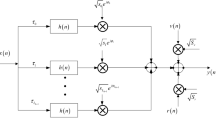Abstract
This paper investigates the inphase/quadrature phase (I/Q) imbalance problem in quadrature amplitude modulation (QAM) communication systems with multi-antenna receivers. Two application scenarios are considered: adaptive beamforming and multi-user detection based on blind source separation (BSS). Our analysis illustrates that, in both scenarios, the effect of the transmitter and receiver I/Q imbalance can be mitigated through straightforward digital signal processing methods. For adaptive beamforming systems, increasing the number of receiver branches automatically suppresses the interference induced by transceiver I/Q imbalances. For the multi-user detection application, a simple alternative expression of the signal model can be adopted, which separately lists the inphase and quadrature phase components of the received signals and the source signals. As a result, the BSS estimation of all user signals can be conducted in the presence of transceiver I/Q imbalances. Simulation results confirmed the effectiveness of the presented I/Q imbalance correction techniques.




Similar content being viewed by others
References
Mitola J III (1992) Software radios-survey, critical evaluation and future directions, National Telesystems Conference, pp 13/15–13/23
Matyjas J (2012) Communications & networking technology thrust, AFRL/RI Connectivity & Dissemination CTC briefing at Cyber and Information Challenge Conference
Yu L, Snelgrove W (1999) A novel adaptive mismatch cancellation system for quadrature IF radio receivers. IEEE Trans Circuits Syst II Analog Digit Signal Process 46(6): 789–801
Valkama M, Renfors M, Koivunen V (2001) Advanced methods for I/Q imbalance compensation in communication receivers. IEEE Trans Signal Process 49(10):2335–2344
Anttila L, Valkama M, Renfors M (2008) Circularity-based I/Q imbalance compensation in wideband direct-conversion receivers. IEEE Trans Veh Technol 57(4):2099–2113
Liu J et al. (2004) Impact of front-end effects on the performance of downlink OFDM-MIMO transmission. IEEE Radio and Wireless Conference, pp 159–162
Rao RM, Daneshrad B (2004) I/Q mismatch cancellation for MIMO-OFDM systems, IEEE International Symposium on Personal, Indoor, Mobile, Radio Communication, pp 2710–2714
Schenk TCW, Smulders PFM, Fledderus ER (2006) Estimation and compensation of TX and RX IQ imbalance in OFDM-based MIMO systems. IEEE Radio and Wireless Conference, pp 215–218
Kamata H, Sakaguchi K, Araki K (2005) An effective IQ imbalance compensation scheme for MIMO-OFDM communication system, IEEE International Symposium on Personal, Indoor, Mobile Radio Communications
Tarighat A, Sayed AH (2005) MIMO OFDM receivers for systems with IQ imbalances. IEEE Trans Signal Process 53(9):3583–3596
Schenk TCW, Smulders PFM, Fledderus ER (2006) Estimation and compensation of frequency selective TX/RX IQ imbalance in MIMO OFDM systems, IEEE International Conference in Communications, pp 251–256
Gao J, Zhu X, Lin H, Nandi AK (2009) Blind I/Q imbalance compensation using independent component analysis in MIMO OFDM systems, IEEE Wireless Communications and Networking Conference, pp 1–6
Qi J, Aissa S (2010) Analysis and compensation of i/q imbalance in MIMO transmit-receive diversity systems. IEEE Trans Commun 58(5):1546–1556
Cao M, Ge H (2008) I/Q imbalance in MIMO STBC communication systems: Impact and solution, 2008 I.E. Military Communications Conference, San Diego, CA, pp 1–4
Zarei S, Gerstacker W, Schober R (2015) I/Q imbalance aware widely-linear channel estimation and detection for uplink massive MIMO systems, 2015 International Symposium on Wireless Communication Systems (ISWCS), Brussels, pp 646–650
Liu ZJ, Sun DC, Wang JL, Yi KC (2013) Impact and compensation of I/Q imbalance on channel reciprocity of time-division-duplexing multiple-input multiple-output systems. IET Commun 7(7):663–672
Zarei S, Gerstacker W, Schober R (2014) I/Q imbalance aware widely-linear precoding for downlink massive MIMO systems, 2014 I.E. Globecom Workshops, Austin, TX, pp 301–307
Zhang W, Lamare RCD, Chen M (2014) Reduced-rank widely linear precoding in Massive MIMO systems with I/Q imbalance, 2014 22nd European Signal Processing Conference (EUSIPCO), Lisbon, pp 331–335
D. Saffar, N. Boulejfen, F. Ghannouchi, M. M. Helaoui, A. Gharssalah (2013) Compensation of I/Q impairments and nonlinear distortion in MIMO wireless transmitters, New Circuits and Systems Conference (NEWCAS), 2013 I.E. 11th International, Paris, pp 1–4
Yang T, Salama Y, Matyjas J, Michalak R (2014) Blind source separation-based multi-user detection for multi-antenna QAM receivers with I/Q imbalances, 2014 I.E. International Conference on Electro/Information Technology, pp 221–224
Yang T, Salama Y, Matyjas J, Michalak R (2014) Study of the I/Q imbalance problem in adaptive beamforming receivers, 2014 NSF/INL (Idaho National Laboratory) National Wireless Research Collaboration Symposium, pp 95–99
Razavi B (1998) RF Microelectronics. Prentice Hall
Saxena J, Rai CS, Bansal PK (2007) Near–far resistant ICA based detector for DS-CDMA systems in the downlink. Wirel Pers Commun: Int J 43(2):341–353
Sun YJ, Qiu DD, Rao JR, Zong P, Becerra DR (2012) Research on adaptive beamforming algorithm, 2012 International Conference on Image Analysis and Signal Processing (IASP), pp 1–3
Haykin S (1996) Adaptive filter theory. Prentice Hall
Widrow B, McCool J, Ball M (1975) The complex LMS algorithm. Proc IEEE 63(4):719–720
Larsson EG, Tufvesson F, Edfors O, Marzetta TL (2014) Massive MIMO for next generation wireless systems. IEEE Commun Mag 52(2):186–195
Liu H (2003) Error performance of MIMO systems in frequency selective Rayleigh fading channels, IEEE Globecom, pp 2104–2108
Hyvärinen A, Oja E (1997) A fast fixed-point algorithm for independent component analysis. Neural Comput 9(7):1483–1492
Hyvärinen A (1999) Fast and robust fixed-point algorithms for independent component analysis. IEEE Trans Neural Netw 10(3)
Acknowledgments
The research presented in this paper was supported in part by the National Aeronautics Space Administration through the University of Central Florida’s NASA Florida Space Grant Consortium and Space Florida.
Author information
Authors and Affiliations
Corresponding author
Rights and permissions
About this article
Cite this article
Yang, T. Study of I/Q imbalances in QAM communication systems adopting multi-antenna receivers. Ann. Telecommun. 71, 691–698 (2016). https://doi.org/10.1007/s12243-016-0541-8
Received:
Accepted:
Published:
Issue Date:
DOI: https://doi.org/10.1007/s12243-016-0541-8




